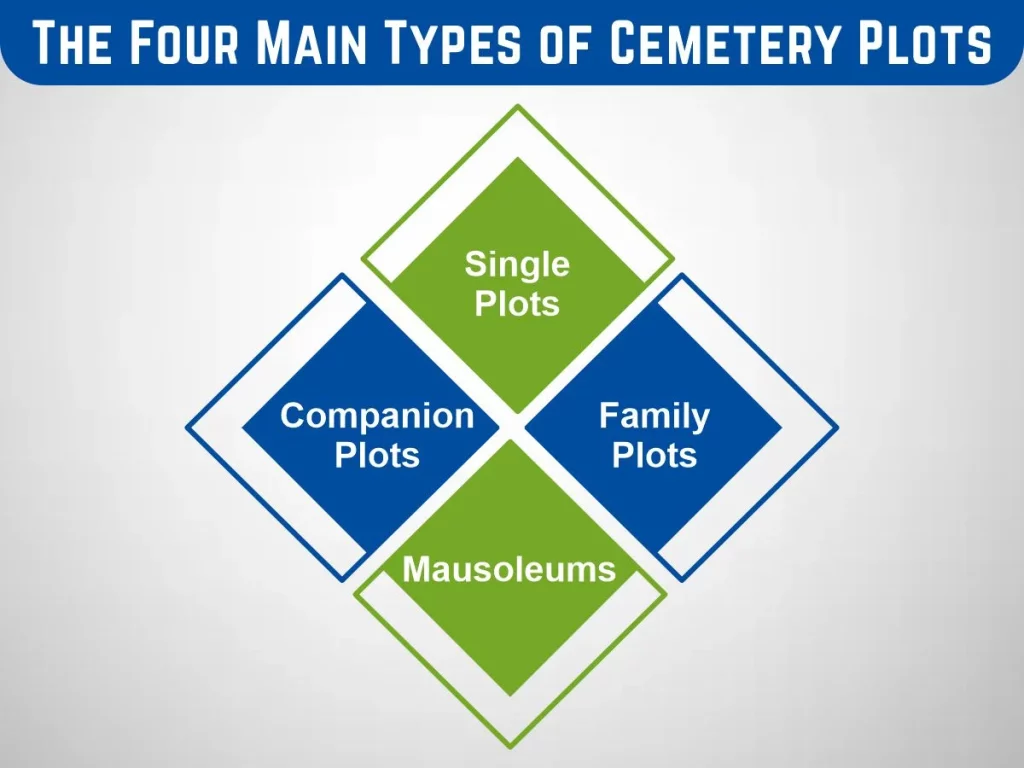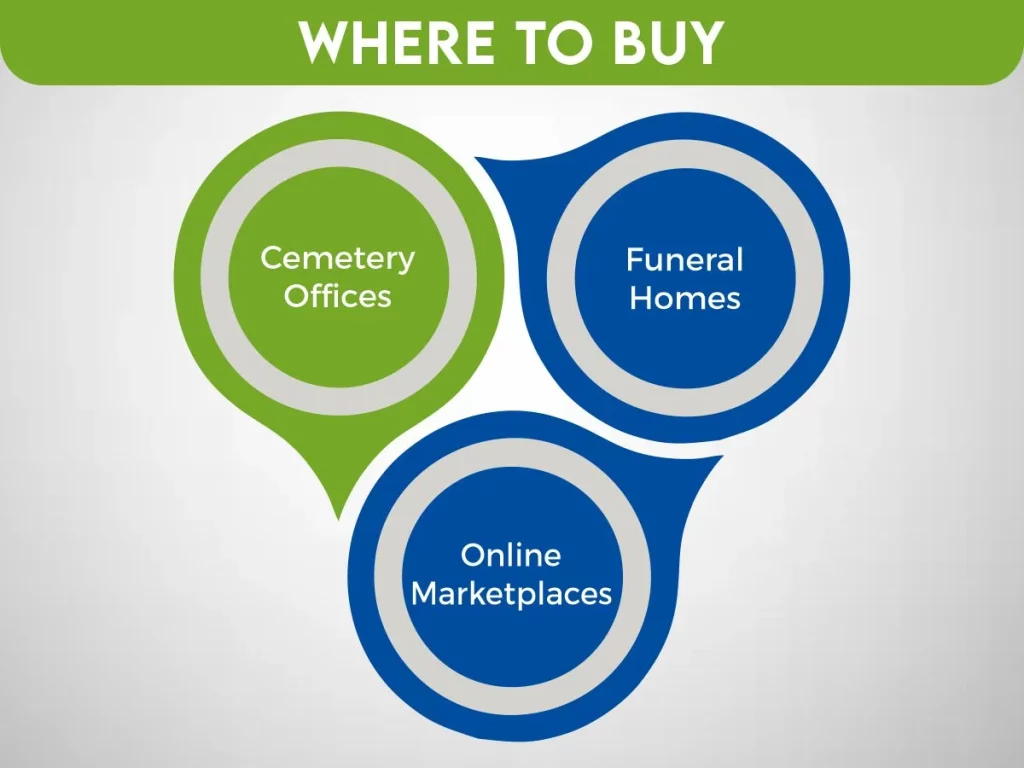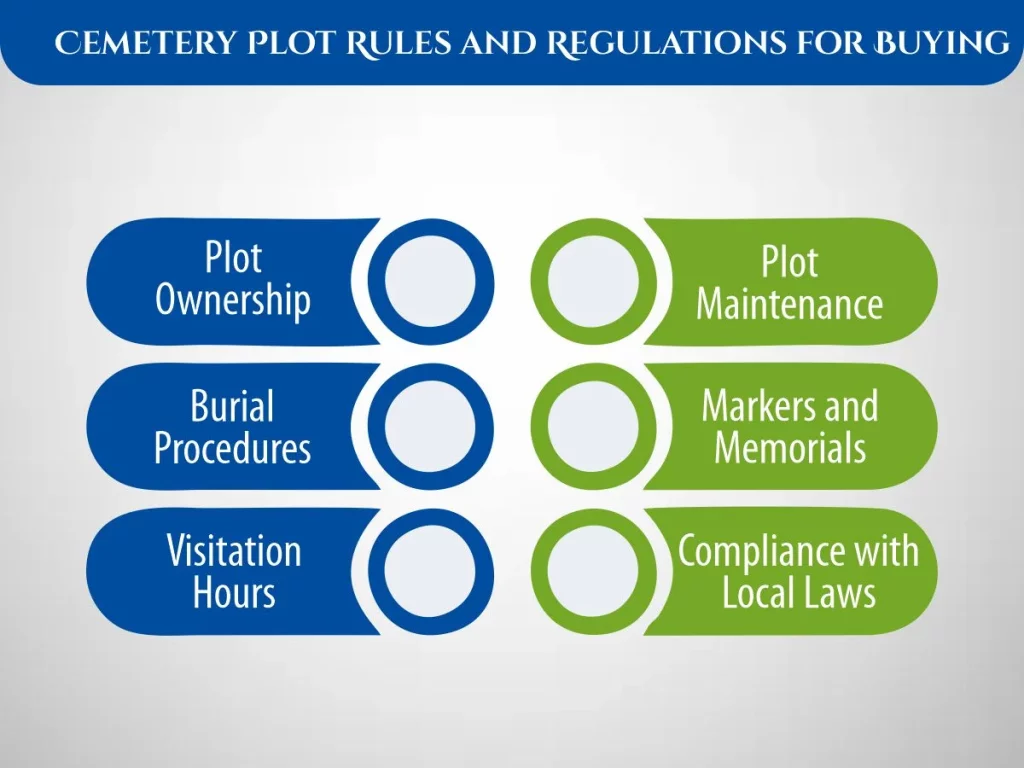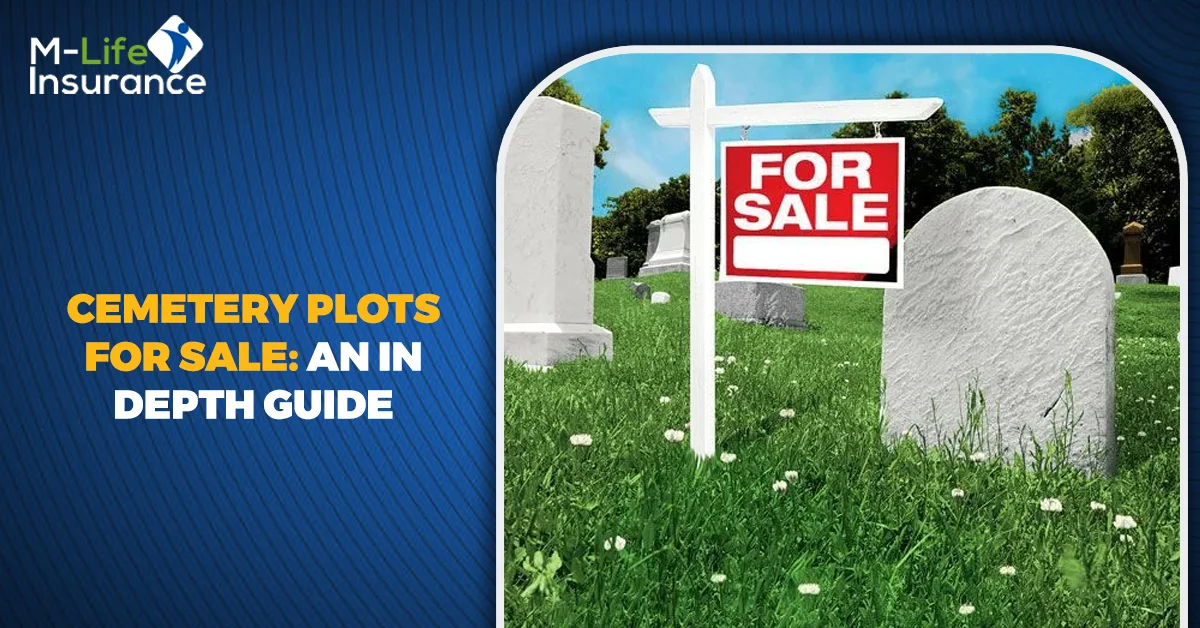Cemetery Plots for Sale
Death is a difficult topic to think about, but it is an inevitable part of life. Planning for your final resting place can be a practical and responsible step to take and cemetery plots can be the best fit. Do you want to get such a plot but be confused about pricing and other factors? Well! This blog post is for you.
This cemetery plot buying guide is designed to help you make practical decisions about your end-of-life arrangements. We will leave the emotions aside and focus on the facts, so you can make a choice that is right for you and your loved ones.
We will help you navigate the world of cemetery plots with ease and clarity. Additionally, we will discuss the factors that influence cemetery plot prices and provide tips for making a well-informed decision. So let’s get started!
What is a Cemetery Plot?
A cemetery plot, often referred to simply as a “plot,” is a designated piece of land within a cemetery that is used for the burial of human remains. It is the final resting place for individuals who have passed away. Cemetery plots come in various sizes and types, and each plot is typically marked by a headstone, grave marker, or other memorial to commemorate the person buried there.
Cemetery plots are an essential component of the funeral and burial process. They provide a physical location for loved ones to visit and pay their respects, offer a place of remembrance, and allow for the preservation of a person’s memory and legacy.
The Four Main Types of Cemetery Plots
Cemetery plots come in various types to cater to the diverse needs and preferences of individuals and families. The four main types of cemetery plots are:

1- Single Plots
A single plot is designed to accommodate one casket burial. It is the most common type of cemetery plot and is often the most affordable option. Single plots are typically used for individual burials and allow for the placement of a single headstone or grave marker.
2- Companion Plots
Companion plots, also known as double plots, are intended for two casket burials. These plots are often chosen by couples who wish to be buried side by side, ensuring they remain together in the afterlife. Companion plots may have space for a single, larger headstone that memorializes both individuals.
3- Family Plots
Family plots are larger in size and designed to accommodate multiple burials. They are typically chosen by families who want to be buried together in a shared space. Family plots may have enough space for multiple headstones or markers, allowing each individual’s identity to be honored.
4- Mausoleums
Mausoleums offer an above-ground burial option. These structures house caskets or urns within a building or a dedicated space. Mausoleums are often used for families or individuals who prefer above-ground internment and may include shared or private sections within the mausoleum structure.
Purchasing Cemetery Plots: Where and How
When you decide to buy a cemetery plot, two key considerations come into play: where to buy and how to buy. These decisions can significantly impact your experience and satisfaction with your final resting place. Here’s a closer look at each aspect:
Where to Buy:

- Cemetery Offices: Most cemeteries have their own offices or administration buildings on-site. This is often the most convenient place to inquire about and purchase cemetery plots. You can obtain information about available plots, their locations within the cemetery, and pricing. Cemetery staff can guide you through the selection process and answer any questions you may have.
- Funeral Homes: Some funeral homes also offer cemetery plots for sale. If you’re making funeral arrangements with a particular funeral home, they can provide information on cemetery plot options. This can be a convenient choice if you’re already working closely with a funeral home, as they can help coordinate various aspects of the burial process.
- Online Marketplaces: In the digital age, you can find cemetery plots for sale on various online platforms. However, when considering this option, exercise caution and due diligence. Ensure that the seller is legitimate and that you thoroughly research the plot’s location and the rules and regulations of the cemetery. Buying online can be convenient, but it’s essential to verify the credibility of the seller and the accuracy of the information provided.
How to Buy:
The decision of how to buy when it comes to cemetery plots involves several factors:
- Type of Plot: Consider whether you need a single plot for an individual, a companion plot for a couple, a family plot for multiple family members, or a mausoleum plot for above-ground burial. The choice depends on personal preferences, family needs, and cultural or religious traditions.
- Location within the Cemetery: Depending on the cemetery’s layout, you may have options for specific sections or areas within the cemetery. Some people prefer plots in serene and peaceful locations, while others may have a preference for plots in proximity to existing family plots or memorials. The choice of location can be a deeply personal one.
- Budget: Cemetery plots come in a range of prices, so it’s important to consider your budget. Single plots are often more affordable than companion or family plots, and above-ground mausoleum plots may have their own pricing structure. Be sure to explore plots that align with your financial considerations.
Ultimately, the “where” and “how” of buying a cemetery plot should align with your personal preferences, your family’s needs, and your budget. By carefully considering these factors, you can make an informed decision that ensures your final resting place meets your expectations and desires.
What Are the Benefits of Cemetery Plots?
Cemetery plots offer several benefits, making them a preferred choice for many individuals and families when it comes to end-of-life planning. Here are some of the key advantages of purchasing cemetery plots:
How Much Does Life Isurance Cost?
1- A Place of Remembrance
Cemetery plots provide a designated and permanent place for the deceased to be remembered and honored. Loved ones can visit the plot to pay their respects, reflect, and remember the person who has passed away. Having a specific location for this purpose can offer comfort and solace to those left behind.
2- Family Tradition
Many families choose to be buried together in family plots. This tradition allows family members to remain together even in death, fostering a sense of togetherness and continuity across generations. Family plots often become a place where family history is preserved and celebrated.
3- Cultural and Religious Considerations
For many individuals, their cultural or religious beliefs and traditions emphasize the importance of burial in a consecrated and dedicated place. Cemetery plots offer a space that aligns with these beliefs and provides a sense of sanctity.
4- Maintenance and Perpetual Care
Cemeteries often have perpetual care funds that ensure the ongoing maintenance and upkeep of the cemetery grounds. This includes landscaping, security, and general care, providing a well-maintained and tranquil environment for visitation.
5- Support during Grief
Having a specific place to visit and remember the deceased can provide a sense of support and solace during the grieving process. It allows for a tangible connection to the loved one’s memory.
Average Cemetery Plot Costs in the United States
As mentioned above, the cost of cemetery plots can vary significantly depending on various factors, including location, cemetery type, and burial options. Here’s a table with approximate average cemetery plot costs by state:
| State | Average Cemetery Plot Cost | State | Average Cemetery Plot Cost |
| Alabama | $1,000 – $4,000 | New Jersey | $1,500 – $10,000 |
| Alaska | $1,500 – $5,000 | New Mexico | $1,000 – $5,000 |
| Arizona | $1,000 – $5,000 | New York | $2,000 – $15,000 |
| Arkansas | $800 – $3,500 | North Carolina | $1,000 – $5,000 |
| California | $2,000 – $15,000 | North Dakota | $800 – $3,000 |
| Colorado | $1,000 – $7,000 | Ohio | $1,000 – $6,000 |
| Connecticut | $1,500 – $10,000 | Oklahoma | $800 – $4,000 |
| Delaware | $1,000 – $5,000 | Oregon | $1,000 – $7,000 |
| Florida | $1,000 – $10,000 | Pennsylvania | $1,000 – $8,000 |
| Georgia | $1,000 – $5,000 | Rhode Island | $1,500 – $8,000 |
| Hawaii | $2,000 – $6,000 | South Carolina | $1,000 – $5,000 |
| Idaho | $800 – $4,000 | South Dakota | $800 – $3,500 |
| Illinois | $1,000 – $7,000 | Tennessee | $800 – $5,000 |
| Indiana | $1,000 – $5,000 | Texas | $1,000 – $8,000 |
| Iowa | $1,000 – $3,500 | Utah | $1,000 – $5,000 |
| Kansas | $800 – $4,000 | Vermont | $1,000 – $4,000 |
| Kentucky | $1,000 – $5,000 | Virginia | $1,000 – $5,000 |
| Louisiana | $1,000 – $5,000 | Washington | $1,000 – $8,000 |
| Maine | $1,000 – $4,000 | West Virginia | $800 – $4,000 |
| Maryland | $1,500 – $10,000 | Wisconsin | $1,000 – $5,000 |
| Massachusetts | $1,500 – $15,000 | Wyoming | $800 – $4,000 |
| Michigan | $1,000 – $7,000 | Missouri | $800 – $5,000 |
| Minnesota | $1,000 – $5,000 | Montana | $1,000 – $4,000 |
| Mississippi | $800 – $3,500 | Nebraska | $800 – $4,000 |
| Missouri | $800 – $5,000 | Nevada | $1,000 – $5,000 |
Keep in mind that these are approximate averages, and the actual cost can vary widely depending on factors like the cemetery’s location, its amenities, and the specific plot’s features (e.g., single or double-depth plots, mausoleum spaces, or cremation plots). It’s essential to contact local cemeteries or memorial parks for precise pricing information in your area.
Cemetery Plot Rules and Regulations for Buying
Cemeteries have rules and regulations in place to ensure that the burial process is conducted respectfully and to maintain the integrity of the cemetery grounds. Understanding these rules and regulations is crucial when buying a cemetery plot.
Here are some common cemetery plot rules and regulations you should be aware of:

- Plot Ownership
Cemeteries often have rules governing plot ownership. They may specify that plots can be purchased by individuals or families and may have restrictions on the transfer of ownership. Some cemeteries require that plots be used only for the interment of the plot owner and their immediate family members.
- Plot Maintenance
Cemeteries typically have guidelines regarding the maintenance of plots. This includes rules about the types of grave markers or headstones allowed, as well as regulations regarding decorations, flowers, and other memorial items.
- Burial Procedures
There are usually rules governing the procedures for burials. This includes guidelines on casket specifications, grave liners or vaults, and the preparation and sealing of the grave. Cemeteries may also have designated hours for burials.
- Markers and Memorials
Regulations regarding grave markers, headstones, or other memorials are common. These rules often pertain to the size, design, and materials used for markers. Cemeteries may have an approval process for selecting and placing these items.
- Visitation Hours
Cemeteries often have established visitation hours. Knowing when the cemetery is open to the public can help you plan your visits and any memorial services or gatherings.
- Compliance with Local Laws
Cemeteries are also subject to local, state, and federal laws and regulations. Understanding and following these legal requirements is essential.
Frequently Asked Questions (FAQs)
1- What Factors Affect Cemetery Plot Prices?
Cemetery plot prices can vary widely based on several factors, including:
- Location: Cemetery plots in urban areas or well-established cemeteries tend to be more expensive than those in rural areas.
- Cemetery Type: Different types of cemeteries (e.g., public, private, religious) may have varying pricing structures.
- Plot Size: The size of the plot, whether it’s a single, companion, family, or mausoleum plot, will influence the price.
- Amenities: Some cemeteries offer additional amenities, such as perpetual care, landscaping, and maintenance, which can affect the cost.
- Region and State: As shown in the table, the cost of cemetery plots can significantly differ from one state to another.
- Burial Options: The choice between in-ground burial or above-ground mausoleum burial can impact the cost.
- Market Demand: High-demand areas may have higher prices due to limited availability.
2- How Much Should a Cemetery Plot Cost?
The cost of a cemetery plot can vary widely based on the factors mentioned above. On average, single plots are often more affordable, ranging from $800 to $8,000, while companion plots can cost between $1,000 and $10,000 or more. Family plots may range from $1,000 to $15,000 or higher, and mausoleum plots may have their own pricing structure, which can exceed $15,000.
Your budget plays a significant role in determining how much you should spend on a cemetery plot. It’s essential to assess your financial considerations and choose a plot that aligns with your budget while meeting your personal and family needs.
3- Where can you find gravesites for sale?
You can find gravesites for sale through various channels, including:
Local Cemeteries: Contact cemeteries in your area or the area where you wish to be buried to inquire about available gravesites for sale.
Funeral Homes: Many funeral homes have relationships with local cemeteries and can assist you in finding and purchasing gravesites.
Online Platforms: There are websites and online marketplaces that specialize in the sale of gravesites and cemetery plots. These platforms often list available plots from cemeteries across the country.
Real Estate Agents: In some cases, real estate agents may be involved in the sale of gravesites, especially for private or family-owned cemeteries.
Cemetery Associations: Some cemeteries are managed by associations or organizations that may have information on available gravesites for sale.

Joyce Espinoza, Expert Life Insurance Agent
Joyce Espinoza is a trusted life insurance agent at mLifeInsurance.com. She’s been in the insurance industry for over ten years, helping people, especially those with special health conditions to find the right coverage. At MLife Insurance, Joyce writes easy-to-understand articles that help readers make smart choices about life insurance. Previously, she worked directly with clients at Mlife Insurance, advising nearly 3,000 of them on life insurance options.


